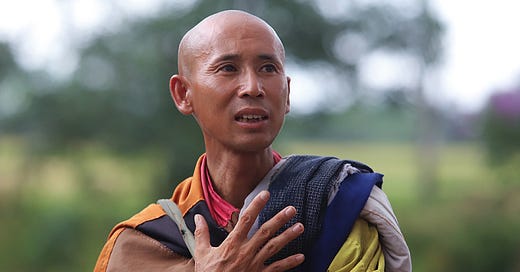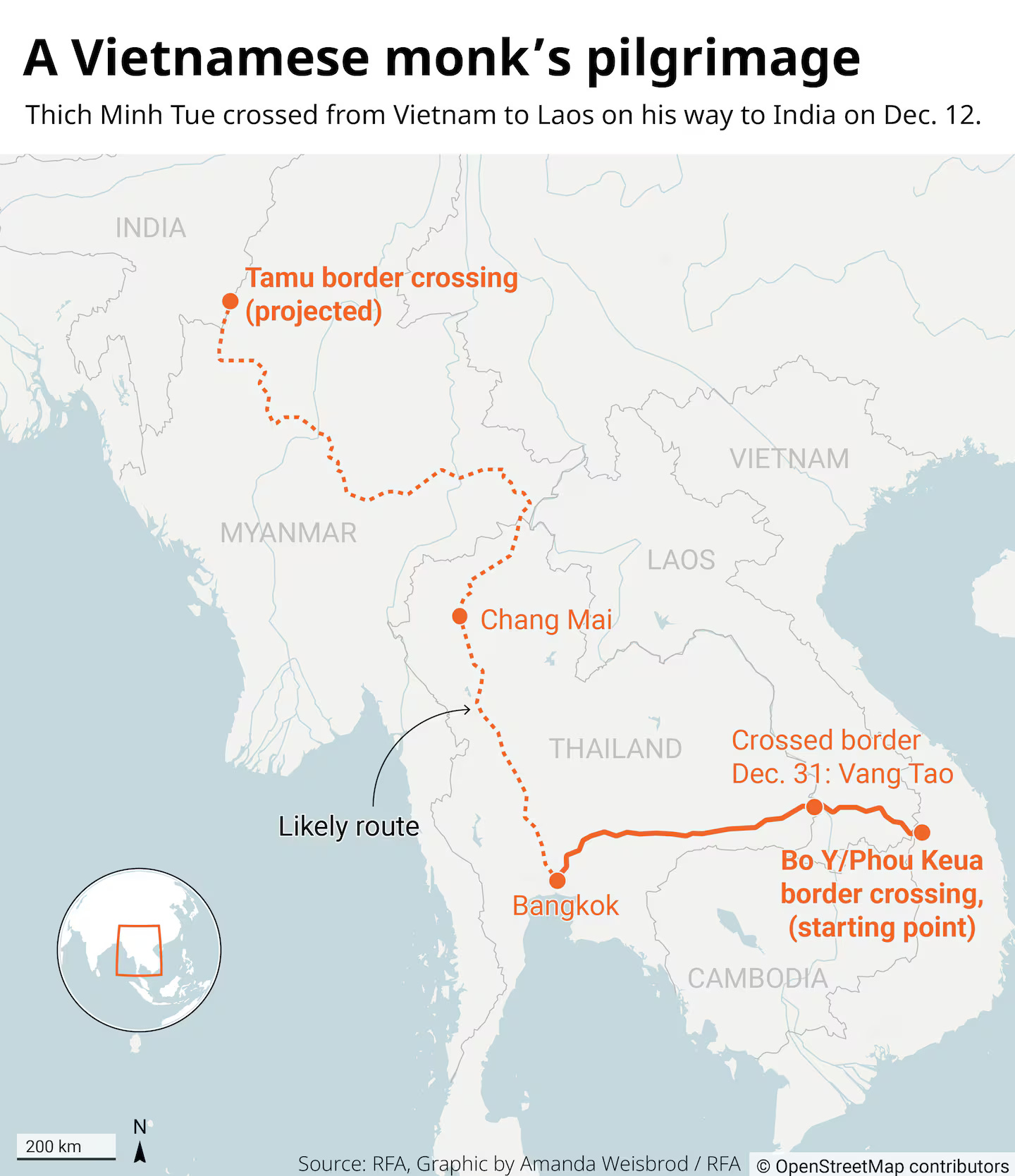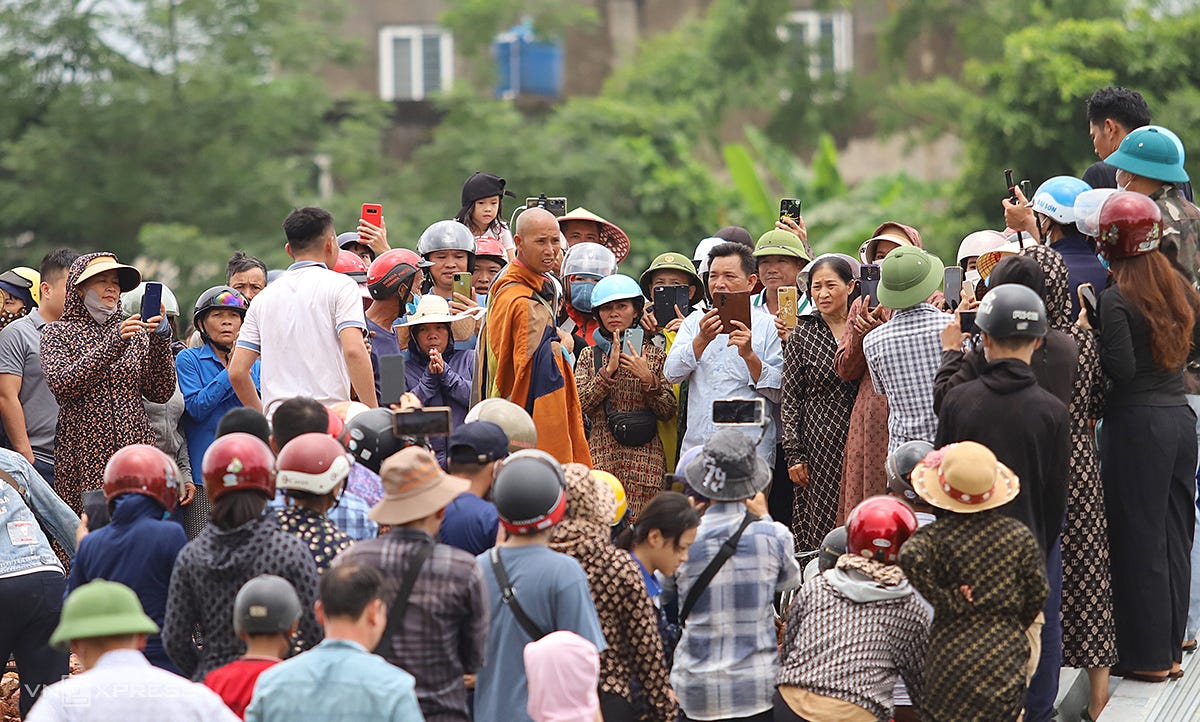Everyone in what I call the Vietnosphere - the Wide-World of Vietnamese - knows about the ‘Barefoot Monk’ who became an instant social media sensation last May after walking alone around Vietnam for six years sleeping rough, begging with a discarded rice-cooker and dressed in a colourful robe of discarded rags. Suddenly, the 43-year old Thích Minh Tuệ (pronounced Tway) was swarmed by the public wanting to take his picture and shoot videos. Others desperately followed him, one dying from heart failure and two downed by heat stroke. Fearful of a popular movement they could not control, Vietnam’s Communist Government quickly shut him down. And now - good riddance they must be thinking - the Monk is trekking all the way to India where Buddhism began.
Our home television’s been tuned into the Barefoot Monk’s pilgrimage all through our Christmas and New Year period, here a typical scene from his passage through southern Laos. The coverage has been literally around the clock on Vietnamese language YouTube channels.
It’s a fantastic story of pilgrimage that’s absorbed my wife Kim-Dung and me on YouTube over Christmas & New Year’s down in Australia from the monk and his small band crossing out of Vietnam’s Central Highlands through southern-most Laos with its Bolaven Plateau in the distance and 19 days of walking before crossing the mighty Mekong River at Pakse and then into Thailand’s Udon Ratchatani Province on New Year’s Eve.
Everywhere the colourful monk walks, villagers kneel reverently by the roadside scattering flowers and water. They offer food and drink that overflows their escorting vehicles and then donated to others along the way. We can even watch it ‘Live’ on YouTube with thousands of other subscribers! And what a sight it’s been. Genuinely moving at times too. Who knows how long it’ll take to reach India, especially getting through war-torn northern Myanmar (Burma)?
As an old foreign correspondent, I’m surprised nobody’s picked up this story - if nothing else as a relief from much more grim news out there. But also a reminder to the world of how controlled everything is in today’s Vietnam, including the practice of religion. And media, too, and perhaps that’s why western media based in Vietnam haven’t reported on this social media phenomenon. (There’s no excuse now.) But then, just how ‘viral’ does anything have get these days to ‘cross-over’ into the Mainstream Media? No story here, right?
The only news outlet making a run with this story is US-funded Radio Free Asia (RFA) which is banned in Vietnam and, just today, the BBC who are also banned in that country. The Vietnamese media haven’t touched the story since the Monk publicly announced his retirement on state media last July which nobody believed and dispersed his last walk around Hue, the former royal capital. Clearly ordered off the story. At the same time, however, anyone in Vietnam can still thankfully follow the monk’s journey on YouTube, Facebook and other social media.
But what makes the ‘Barefoot Monk’ all the more interesting is that he’s not really a Buddhist monk at all. Sure, he studied and got his name, but dropped out and started walking around Vietnam. And a lot of his popularity, as an RFA story explains, is “because he appeared more genuine than monks recognized in Vietnam’s state-backed Buddhist system, thereby exposing their moral degradation.” Stories abound about their corruption and lavish lifestyles, plus Vietnam’s super rich ‘buying merit’ building huge Buddhist complexes everywhere, most notably on sacred Black Virgin Mountain (Nui Ba Den) northwest of Saigon (Ho Chi Minh City.)
“Those who can gather or influence large groups of people are always a thorn in the side of authoritarian governments,” one source told RFA, adding that this may be why the authorities decided to let him leave Vietnam to practice his faith elsewhere. It could be part of a strategy of keeping him out of sight domestically, while simultaneously it is good optics internationally to allow Tue to leave.
“In leaving Vietnam, it is almost as if Tue is seeking religious refuge abroad,” explained Thanh Nhan, a Vietnamese American, who has closely followed Tue’s journey, told RFA. “After leaving Vietnam, his journey will likely go smoother and he will likely continue to be followed by the media, she said.
“It would be a great loss for Vietnam if he becomes famous, because he will be known as a genuine monk that is rejected by his own country.”
Allowing Tue to leave for India is a win-win situation, explained Buddhist scholar Nguyen Thanh Huy. “It alleviates the challenges in ensuring security and reduces societal pressure stemming from waves of public opinion.”
From RFA, here’s a map of the Barefoot Monk’s possible route through Thailand, including Bangkok, but getting through northern Myanmar (Burma) where civil war rages could be quite a challenge. At the moment, he’s only four days inside Thailand way east-northeast of Bangkok.
And for more background, here is the very tame way this social media story first crossed-over into the Vietnam Media last May and from the English-language edition of VNExpress International of May 18th. Today, no coverage at all.
Pilgrim spends 6 years traversing Vietnam on foot
A man from central Vietnam has been walking throughout the country since 2017 as a form of personal pilgrimage.
During his journey from the north to the south, 43-year-old Thich Minh Tue, born Le Anh Tu, took a rest at a vacant lot in the central province of Ha Tinh’s Cam Xuyen District on Friday.
Hundreds gathered around to hear him speak.
Tu said he was originally from Ha Tinh, but his family moved to the Central Highlands' Gia Lai Province in 1994. He was formerly a monk at a pagoda, where he took the Buddhist name Thich Minh Tue.
"'Minh' means bright, while 'Tue' means intelligence. The whole name means 'the shone way'," Tu said, adding that when he left the pagoda, he kept his Buddhist name.
Tu said he is neither a Buddhist monk nor affiliated with any pagoda or institution under the Vietnam Buddhist Sangha.
Over the past few years, he has been studying the teachings of the Buddha and learning ascetic practices, which involve letting go of conveniences and embracing difficulties, such as abstaining from food and wearing simple clothing, in order to attain enlightenment.
As part of his ascetic practices, Tu has been walking across Vietnam since 2017.
He said that in the early days of his practice he sometimes travelled by bus. However, he said that since 2020, he has been traveling entirely on foot, except for using a few marine vessels to cross various waterways. He said he has been to almost every corner of Vietnam, except for a few provinces.
"My journey is a lifelong walk. I don't intend to spread any message, as everything in Buddhism has been taught by the Buddha. I just want to practice per the teachings of the Buddha to complete myself. When I walk, I pray for everyone to always be happy with their families," he said.
In the past he used to doubt the teachings of the Buddha, but Tu said he is now more mature and so he wants to follow the teachings to see if they can bring greater happiness. He said he had spent a long time thinking before seeking for his parents' approval to leave home and follow his path.
On his journey, Tu has been collecting rags on the side of the road or from trash bins in order to stich them together as clothing. He eats only one meal a day. He bathes in rivers and streams, rests on the side of the road, and relieves himself at gas stations.
"For me, the walking journey is not difficult. When I'm on the move, if my mind is peaceful and happy, there are no obstacles in my way," he said.
As his long walk has continued, many people have dressed like monks and followed him.
While Tu said they are not his disciples, he also welcomes anyone who wants to join the trek. Tu simply asks them to seek approval from their families, as is the tradition for renunciates. He also encourages them to go home whenever they feel they are done with their journey.
More recently, Tu sometimes finds himself surrounded by people asking to take pictures and record videos with him. But he's said it is better to simply walk alongside him. He has voiced his disapproval for those who create scenes around him.
Even though he has not been in contact with his family for six years – he does not use phones or social media – Tu said he will always be grateful for his parents.
He said he has never called himself a monk, and that he does not feel that he is worthy of such a title yet.
Le Xuan, 84, Tu's father, said the family has four children. Tu was the second born and joined the army after graduating high school. After he left the army, he pursued a vocational education and then moved to Phu Yen Province to work at a private company.
In 2015, Tu returned home and asked his parents to be "released." After a night of thinking, Tu's parents granted him their approval and blessing to pursue his ascetic path.
Xuan said Tu told him he would study at a monastery in Saigon, but that he had then lost contact with him ever since.
The father only learned of his son’s whereabouts when neighbors showed him videos about the long walk released by the media.
"We saw that he was skinny and wasn’t eating well, so we felt pity for him. But this is his path and we support him," Xuan said.
Not long after his discovery by the public, the instantly-popular ‘Barefoot Monk’ was attracting huge crowds of followers and security officials who first restricted his movements and later publicly announcing his retirement on state media that nobody believed. He’d kept a low profile until beginning his long pilgrimage to India in December - and re-igniting public interest.






